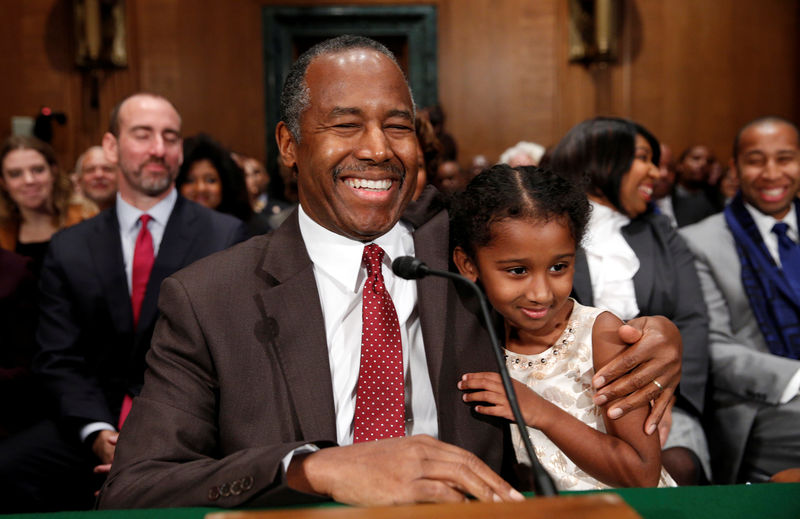By Patrick Rucker and James Oliphant
WASHINGTON (Reuters) - U.S. Senate Democrats on Thursday pressed Ben Carson, Donald Trump's nominee to lead housing policy, on potential conflicts of interest between the agency he is set to run and properties in which the president-elect may hold a financial stake.
The Department of Housing and Urban Development (HUD) hands out billions of dollars each year to developers and landlords. Democrats grilling Carson during his confirmation hearing for the post expressed concerns that some of that taxpayer money could end up directed to Trump or members of his family.
"The president-elect is hiding his family businesses interests from you, from me, and the rest of America," Senator Elizabeth Warren of Massachusetts, one of Trump's most vocal critics, told Carson. "He can divert taxpayer money into his own pockets without the American people knowing about it."
Trump, a New York businessman who got his start in real estate, has refused to release his tax returns or provide detailed information about his holdings across the globe.
On Wednesday, he announced that he would turn control of his business empire over to his two oldest sons and move his assets into a trust. Those moves, however, have not assuaged some critics who argue that, as president, Trump will still have undisclosed financial interests that could affect his policies.
Pushed on the issue by Democrats, Carson at one point vowed he would monitor any potential conflicts of interest but said he was unsure about how to go about it.
Asked how he would prevent conflicts, the retired neurosurgeon and former Republican presidential candidate told the Senate Banking Committee, "I would hope what would happen with this committee is that we could come up with a suggestion that might be acceptable to all sides."
Trump reportedly has an interest in the massive Starrett City housing project in the New York City of Brooklyn, which has received HUD funds. But Trump's real estate career has focused mainly on luxury housing, commercial real estate and resort properties.
Earlier in the hearing, Carson was noncommittal when Warren asked him to ensure that no HUD programs would benefit Trump.
"If there happens to be an extraordinarily good program that is working for millions of people and it turns that someone you're targeting is going to gain $10 from it, am I going to say, 'No, the rest of you Americans can't have it?'" Carson responded.
Carson is widely expected to be confirmed by the Republican-controlled Senate committee and full Senate.
Much of Thursday's hearing focused on Carson's long-standing antipathy toward social-welfare programs, with some senators asking him whether he, in fact, supports HUD's mission to provide housing assistance to millions of Americans.
"I think the rental assistance program is essential," Carson replied. He later, added, however that social programs have to operate within financial constraints.
Much of Carson's remarks focused on his well-documented background growing up poor in inner-city Detroit, saying he learned young what "housing insecurity" means. He provided few details in terms of U.S. housing policy or how he would revamp the agency, suggesting only that he was interested in making it more efficient.
If confirmed as HUD secretary, Carson would oversee an agency with a roughly $40 billion budget that not only helps the poor but underwrites mortgage loans for middle-class families.
HUD's Federal Housing Administration (FHA) stands behind roughly one in five home loans and at least $1.1 trillion in debt - a number that Carson said was troubling.
Outgoing HUD Secretary Julian Castro this week slashed HUD fees for mortgage default insurance, which he said would save the average HUD-backed homeowner $500 a year.
Carson suggested that he would consider reversing that surprise move.

"Certainly, if confirmed, I am going to work with the FHA administrator and other financial experts to really examine that policy," he said.